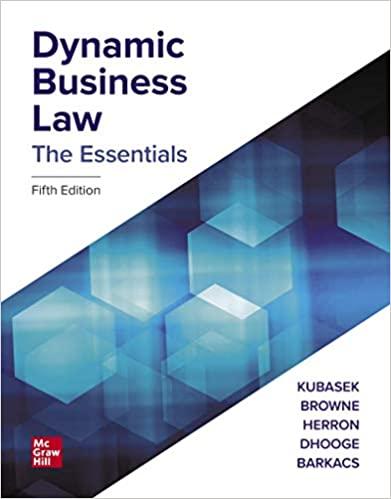David Milam, a member of the Delta Tau Delta fraternity at the University of Kentucky, had leased
Question:
David Milam, a member of the Delta Tau Delta fraternity at the University of Kentucky, had leased a room at the fraternity house. University of Kentucky Police Detective John McBride received a tip that Milam was selling marijuana at the fraternity house, so with two other university police detectives, he went to the house to perform a “knock and talk” investigation. The detectives did not have a warrant to search the house. Upon arriving, the officers went to the back door, believing it was the front door. No one responded to their knocking and ringing the bell several times. Deciding that the fraternity house was more similar to an apartment complex than a private residence, they opened the unlocked and slightly ajar door and entered into the foyer, where they announced their presence. Shortly thereafter, another member of the fraternity, Neagle, entered the foyer area from an adjoining room. Without asking him who he was or whether he was affiliated with the fraternity, the detectives identified themselves as police officers and said that they were looking for Milam. After a brief conversation, the detectives followed Neagle up the stairs to the second floor where the individual rooms were located. Once in the stairwell, the detectives could smell burnt marijuana. At the top of the stairwell, Neagli opened the door to the second floor. Neagli identified Milam’s room by pointing, and the detectives then knocked on the door. Milam opened the door, revealing the strong smell of marijuana. A full jar of marijuana was sitting on the coffee table inside the room, in plain view of the detectives. Milam then consented to the detectives’ searching his bedroom. During the search, they discovered marijuana, $1,700, Adderall pills, drug paraphernalia, and a fake driver’s license. Milam was charged with one count of trafficking in a controlled substance within 1,000 yards of a school, third-degree possession of a controlled substance, possession of drug paraphernalia, and second-degree criminal possession of a forged instrument. In the trial court, Milam argued that the detectives unlawfully entered and searched the house in violation of the Fourth Amendment. Several suppression hearings were held. Ultimately, the trial court denied Milam’s motion to suppress the evidence discovered in his bedroom. Thereafter, Milam entered a conditional guilty plea conditioned on the appeal of the denial of his suppression motion. Pursuant to that agreement, the Appellant pled guilty to the trafficking charge and was sentenced to one-year imprisonment and three years’ probation. The Court of Appeals affirmed the trial court’s denial of Milam’s motion to suppress. Milam appealed again. How do you believe the Kentucky State Supreme Court ruled and why? Be sure to consider the Fourth Amendment in your reasoning.
Step by Step Answer:

Dynamic Business Law The Essentials
ISBN: 9781260253382
5th Edition
Authors: Nancy Kubasek, M. Neil Browne, Daniel Herron, Lucien Dhooge, Linda Barkacs





